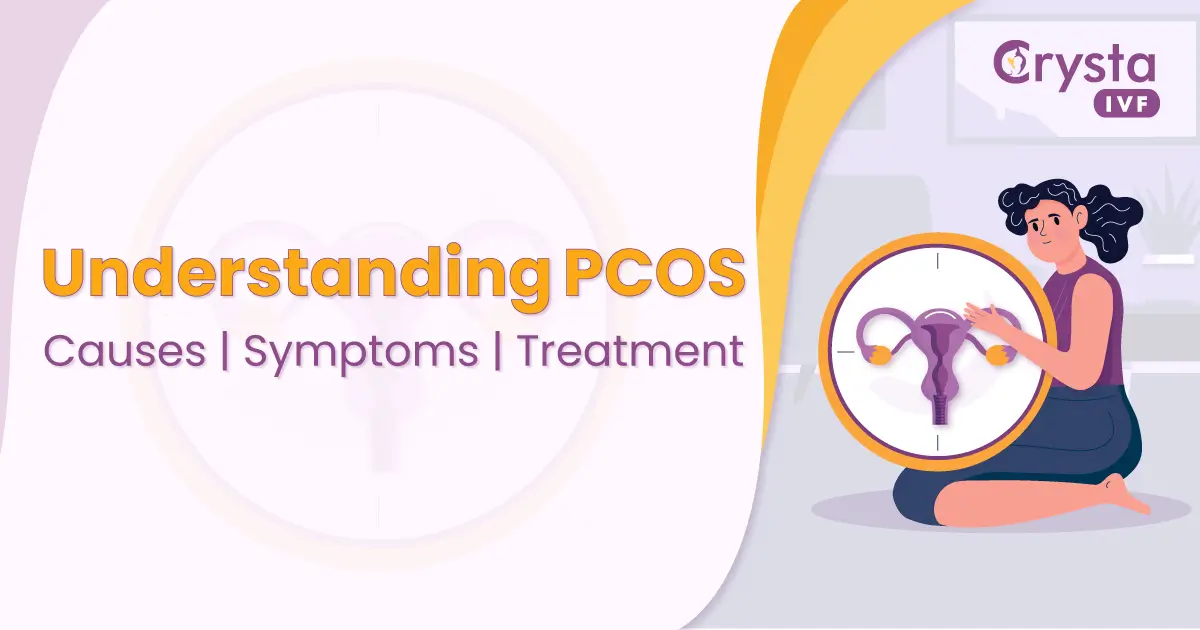Polycystic Ovary Syndrome, also known as PCOS is a very complex problem caused by hormonal disbalance that affects many women worldwide. It impacts their overall health, fertility, and quality of life. Despite its prevalence, PCOS remains widely misunderstood, with many women experiencing frustrating symptoms without knowing the underlying cause. So, in this blog, we will guide you about PCOS, its symptoms, causes and how you can treat it.
What is PCOS?
As mentioned above, Polycystic ovarian syndrome (PCOS) is a problem caused by hormonal imbalance brought on by an over prodcution of hormones inside the ovaries. It means, your ovaries create androgens (male hormones) in abnormally high amounts during PCOS.
About 90% of women who are obese or overweight and 35% of women in their reproductive years may have PCOS, which is mostly a hereditary illness. PCOS is becoming more common in young women and is most likely the main cause of infertility in women.
At What Age Do Women Undergo PCOS?
PCOS can strike women at any point following puberty. Most people are diagnosed with PCOS in their late 20s or 30s when they try to conceive. However, obesity and PCOS in other members of your biological family may increase your risk of developing PCOS.
What are the causes of PCOS?
The precise cause of PCOS is still unknown, however, doctors suggest that heredity and lifestyle are some of the causes of PCOS. In addition to this, obesity is the most significant factor that contributes to PCOS.
- Greater concentrations of androgens, or male hormones:
Your ovaries are unable to release eggs due to high testosterone levels, which results in irregular menstruation cycles. Small, fluid-filled sacs may also form on your ovaries as a result of irregular ovulation.
- Insulin resistance:
In response to an increase in insulin levels, your ovaries produce and release androgens. This male hormone suppresses the production of the ovum and increases PCOS symptoms.
- Low-grade inflammation:
Chronic low-grade inflammation is a common symptom of PCOS patients. Blood tests that evaluate white blood cell and C-reactive protein (CRP) levels can be performed by your healthcare provider to determine the degree of inflammation in your body.
- Lifestyle Modifications:
Maintaining a healthy weight, eating a balanced diet, and exercising frequently can all assist in enhancing insulin sensitivity and hormone balance.
Also Read: Best Age to Get Pregnant with PCOS
What are the Symptoms of PCOS in Women?
PCOS symptoms typically appear gradually at first. Typically, symptoms start to appear in your early teens, around the time you start menstruation. In this age bracket, a sudden increase in weight might exacerbate PCOS symptoms.
While each woman experiences this illness differently, irregular periods—which can range from few or nonexistent to severe, irregular bleeding—are the most typical symptom among female patients.
Other symptoms that are frequently observed are:
- oily skin or acne
- scalp-based hair loss
- Pelvic discomfort
- Repeated miscarriages or
- Infertility due to improper ovulation cycle
- Gaining weight
- Depression or fluctuations in mood
- breathing difficulties during the night
- Uncertainty
Can PCOS Cause Miscarriage?
Women suffering from PCOS have higher chances of pregnancy issues but they can undergo pregnancy through various treatments and lifestyle modifications.
Pregnancy-related PCOS problems also include an elevated risk of:
- Hypertension, preeclampsia, and gestational diabetes
- Preterm birth, defined as birth before 37 weeks of pregnancy
- Delivery by C-section because of excessive blood pressure, diabetes, or obesity
Also Read: How to Avoid Miscarriage with PCOS?
When to See a Doctor for PCOS?
If you think you may have PCOS, get in touch with a medical professional. Among the symptoms that could indicate PCOS are:
- An erratic monthly cycle.
- Long menstrual cycles (more than 40 days without a period)
- Acne, excessive hair growth, or other indicators of high androgen hormone levels.
- Having trouble becoming pregnant.
Can Women Conceive with PCOS?
Yes, it is possible to become pregnant with PCOS. However, PCOS can increase the risk of some pregnancy issues and make it difficult to conceive. Together, you and your doctor will create a plan of care to facilitate ovulation. Medication or assisted reproductive technologies, such as in vitro fertilization (IVF), may be part of your treatment strategy.
Make sure you comprehend your treatment plan and how to improve your chances of a successful pregnancy by speaking with your healthcare professional.
What are the Treatments for PCOS?
Reducing long-term health risks and managing specific symptoms are the main goals of PCOS care. However, based on your problem, the doctors can suggest different treatments for PCOS. Some common treatments for PCOS include:
- Lifestyle Modifications:
A balanced diet, consistent exercise, and weight control are all good ways to increase insulin sensitivity and hormone balance.
- Medication:
Medical professionals may recommend birth control tablets to control menstruation, anti-androgen drugs to treat acne and hirsutism or metformin to enhance insulin sensitivity, depending on the patient’s symptoms.
- Fertility Treatments:
It may be suggested that those attempting to conceive undergo fertility treatments such as in vitro fertilisation (IVF) or ovulation induction.
- Surgery:
In rare instances, cysts or other issues may require surgery to be addressed.
Speaking with a doctor or fertility specialist is the best way to start treatment for your PCOS. If you think you may have PCOS or have been diagnosed with it, you must immediately consult with a doctor to create a management plan that works for you.
Also Read: How to cure PCOS permanently?
What is the Difference Between PCOS and PCOD?
Understanding PCOD
Every month, each of the two ovaries in a woman releases an egg alternatively which releases small amounts of androgens, or male hormones. The disorder known as PCOD (Polycystic Ovarian Disease) causes the ovaries to release a large number of partly or underdeveloped eggs, which eventually develop into cysts. It results in abdominal weight gain, irregular periods, male pattern hair loss, and infertility.
Understanding PCOS
The ovaries of women with PCOS (Polycystic Ovary Syndrome) produce more androgen than normal, which disrupts the formation and release of eggs. A portion of the eggs mature into tiny sacs filled with fluids known as cysts. Rather of being expelled during ovulation, these cysts accumulate and occasionally even expand within the ovaries.
The Bottom Line
A woman with PCOS may experience irregular menstrual cycles and difficulty becoming pregnant. Male hormone excess can also cause undesirable side effects including body and facial hair development.
The initial PCOS therapies that doctors advise are lifestyle changes, and they frequently have positive results. Losing weight can help with PCOS symptoms and increase fertility.
However, it is always advised to consult a doctor if you observe the symptoms of PCOS.



